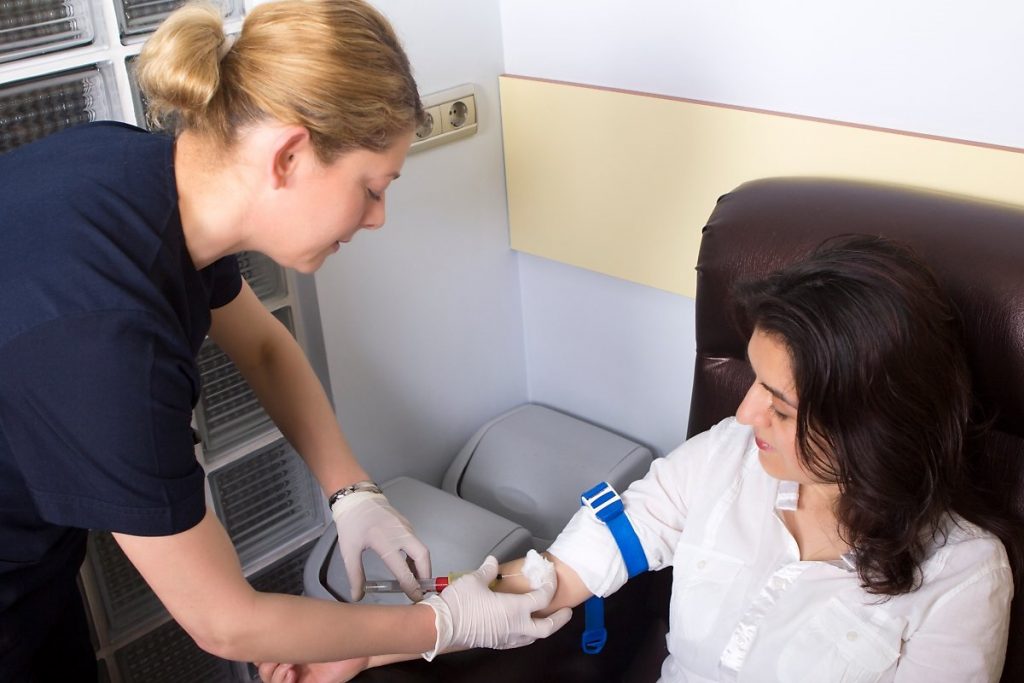Two of the more common symptoms that women with painful uterine fibroids experience are abnormally long periods and heavy bleeding. For many, this can lead to a significant amount of blood loss and additional complications if not properly treated. This raises a crucial question for many of our patients: Is there a link between fibroids and anemia?
The short answer is yes. Excessive blood loss from fibroids can lead to anemia, a condition marked by shortage of red blood cells or dysfunctional red blood cells in the body. Different kinds of fibroids cause more bleeding than others. Speaking generally, excessive blood loss in any type of patient can eventually lead to multi-organ failure and even death if not treated. The good news is that both fibroids and anemia are treatable to improve quality of life. But you must recognize the warning signs.
Fibroids and Anemia: An Overview
What Is Anemia?
Anemia is defined as a low number of red blood cells. These red blood cells store and carry oxygen in the blood. For patients with fewer red blood cells than normal, their tissues and organs such as heart and lungs do not get as much oxygen as usual.
Anemia is the most common blood disorder in the world and affects approximately 1.62 billion people globally. The group affected the most are non-pregnant women (468.4 million). Anemia is diagnosed when a blood test shows a hemoglobin value of less than 13.5 g/dL in a man or less than 12/0 g/dL in a woman.
While poor diet, intestinal disorders, and chronic diseases are typically the cause, other conditions such as uterine fibroids can lead to excessive blood loss. Many women with fibroids do not realize they are anemic, but there are telltale symptoms.
What Are Signs of Anemia?
- Excessive fatigue and loss of energy
- Dizziness
- Unusually rapid heartbeat
- Shortness of breath
- Cold hands and feet
- Pale or yellow skin
- Chest pain
- Headaches
What Are Fibroids?
Uterine fibroids, also called leiomyomas (lie-o-my-O-muhs), are noncancerous growths of the uterus that often appear during childbearing years. Researchers estimate that 70 to 80 percent of all women develop fibroids between 35 and 54. However, fibroids can occur in women younger than 35 and until menopause. Many patients have one or several fibroids that differ in size and either stay that way or grow at different rates. Some women do not experience symptoms.
Why Have Anemia with Fibroids?
Uterine fibroids often cause heavy periods, during which a woman loses more blood than normal while menstruating. Additionally, fibroids may cause a hormonal imbalance which contracts the uterus, also leading to greater blood loss during menstruation.
Fibroid location is also a particular cause for concern when considering the link between fibroids and anemia. The Office on Women’s Health lists four types of fibroids depending on location, all of which can cause anemia.
- Intramural fibroids — These grow inside the muscles of the uterine wall.
- Submucosal fibroids — Fibroids that protrude underneath the uterine lining and into the uterine cavity.
- Subserosol fibroids — These tend to grow just outside the uterine walls.
- Pedunculate fibroids — Fibroids that hang by a thin thread or stalk inside or outside the uterus.
Submucosal fibroids in particular cause severe bleeding by increasing the size of the uterine lining. This can lead to a host of symptoms, the most common being heavy menstrual bleeding and abnormally long periods.
In either case, when a woman experiences heavy or excessive bleeding, she will also lose large quantities of iron and hemoglobin, causing a depletion of oxygen in the body. Without iron, known as iron-deficiency anemia, your body is unable to make new, functional red blood cells.
Therefore, women with fibroids are typically also anemic because there isn’t enough blood and iron-rich protein (hemoglobin) being carried to tissues throughout the body. This can make getting out of bed in the morning difficult and cause a constant feeling of being tired and light-headed.
Fibroids and Anemia: How to Treat Both
If you’ve been diagnosed with fibroids, it is important that you and your doctor keep a watchful eye for the onset of anemia. Even if immediate fibroid treatment isn’t necessary, knowing the symptoms of anemia, doing blood workup for anemia, and staying in communication with your doctor about how you are feeling can help head off larger problems.

Even without anemia many women still need a solution to their painful and/or life interrupting uterine fibroid symptoms. Most of the patients we see seek a non-surgical method for fibroid removal, wanting to avoid incisions and hospital stays, among other issues.
Uterine Fibroid Embolization (UFE) is a unique procedure for fibroid treatment. It can treat uterine fibroids with multiple locations and sizes without having to go through a painful surgery and lengthy recovery time. Rather than remove fibroids, UFE uses X-ray guidance to locate the vessels that supply blood to your fibroids. Small particles are injected through a tiny catheter at your wrist into the vessels, blocking the blood flow to fibroids. This causes fibroids to shrink and die, fostering a dramatic reduction in symptoms for many women.
As a result, you’ll have a quicker recovery time and a greater chance of avoiding additional complications such as severe anemia.
Advantages of UFE Include
- In-office procedure instead of hospital stay
- Recovery time only 7-10 days versus 4-6 weeks for surgery
- No blood loss
- Procedure typically takes less than an hour
- No scarring
- Fibroid-related symptoms improve dramatically
Knowing everything you possibly can about fibroids and anemia and having regular screenings will help you and your doctor determine the right course of action and avoid potential complications in the future.

Get a FREE Phone Screening with Fibroid Institute
Do you have questions about your fibroid symptoms or treatment options? Thousands of women have been treated with Uterine Fibroid Embolization (UFE), the gold standard in non-surgical fibroid treatment.
At Fibroid Institute, we are dedicated to educating and empowering women on fibroid treatment options. With multiple locations in Dallas and Houston, our fibroid clinics help thousands of women find relief from their fibroid symptoms. Our fibroid doctors are board-certified interventional radiologists and experts who are passionate about helping women become #FibroidFree. They are among the most experienced fibroid specialists at a practice that is 100% focused on fibroid treatment in the Dallas and Houston metro areas.
Request a free 10-15 minute phone screening to determine if you are eligible for UFE. After the screening, if you qualify for UFE, you can schedule your onsite or telehealth consultation.
Find out if you are a candidate for UFE. Call for a telehealth consult or an in-office appointment at our Dallas fibroid clinics at 214-838-6440, Houston fibroid clinics at 713-903-3733, or complete the form below.
Prior to starting any new treatment or if you have questions regarding a medical condition, always seek the advice of your doctor or other qualified health provider. This information is not a substitute for professional medical advice.
Fibroid Institute Texas serves the Dallas and Houston areas including Addison, Carrollton, Plano, Frisco, Craig Ranch, McKinney, Allen, Fort Worth, Grand Prairie, HEB, Arlington, Hutchins, Irving, Duncanville, DeSoto, Cedar Hill, Lancaster, Cockrell Hill, Highland Park, University Park, Park Cities, Garland, Mesquite, Richardson, Dallas, Sherman, Houston, Sugar Land, Katy, Webster, Clear Lake, The Woodlands, Universal City, Spring, Kingwood, Stafford, Conroe, Texas City, Cypress, League City, Bellaire, and more.
*Patient names and/or photos may be changed to protect confidentiality.

